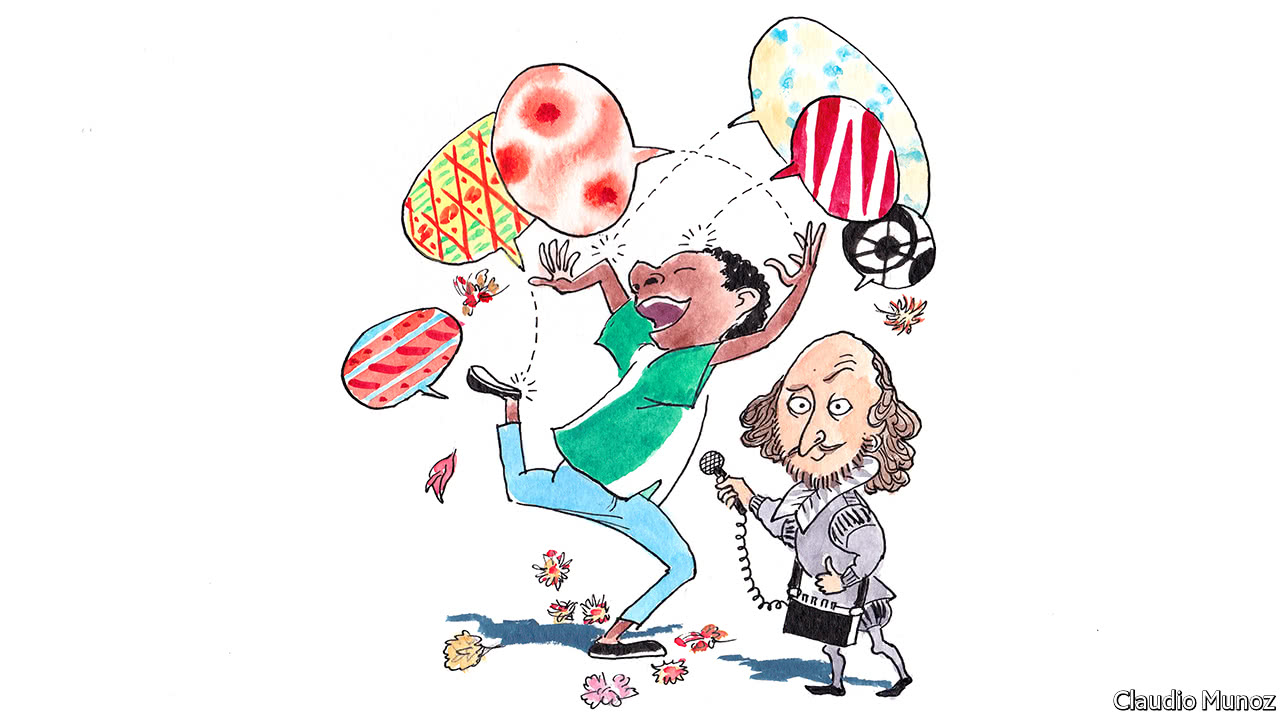The fertile world of Nigerian patois
Urban Nigerians speak a fantastic blend of languages
NO COMPLIMENT was too flowery at the launch in May of “Antidotes for Corruption”, a book by Dino Melaye, a Nigerian senator who has fended off numerous allegations of graft. “What is being launched today is, ipso facto, a new potent Intercontinental Ballistic-cum-Cruise missile—an unassailable Assault weapon against, arguably, Mankind’s Enemy Number One: Corruption,” read the opening sentence of a leaflet handed out at the event. The 43-year-old politician was described as a “unique, strong-willed, opinionated, stubborn, determined, intelligent, prolific and even sexy young man in his prime”.
It is not just Nigerian politics that is prone to verbal flourishes. In December Arik Air, an airline, blamed flight cancellations on the “epileptic” supply of aviation fuel (it was bailed out by the government soon after). Nigerians have taken English, the former colonial language, and made it their own. Many switch back and forth between standard English and Pidgin, peppering their speech with local words and colloquialisms. For example, “gist” is often used both as a noun and a verb meaning “gossip”. Someone going out for the night is “catching fun”. Traffic jams are “go-slows”. A younger girlfriend is a “smallie”.
In a country with more than 500 languages Pidgin English is the lingua franca. Pop culture depends on it. Fela Kuti, one of the most popular Nigerian singers of the 1970s and 1980s, argued that, “You cannot sing African music in proper English.” Many Nollywood producers feel the same about the action films and convoluted romantic dramas that they export all over the continent. The Pidgin phrase Naija no dey carry last, roughly meaning “Nigerians strive to finish first”, has become an unofficial national motto (as well as the title of a book satirising the country).
Many English-language radio hosts talk in accents that indicate they have lived in Britain or America. But Nigerians can also tune in to the Pidgin “people’s station” Wazobia FM and, soon, BBC Pidgin. The celebrated novelist Chinua Achebe’s defence of writing in English, rather than his native Igbo, would ring true today whether spoken by politician or pop star. “We intend to do unheard-of things with it.”
It is not just Nigerian politics that is prone to verbal flourishes. In December Arik Air, an airline, blamed flight cancellations on the “epileptic” supply of aviation fuel (it was bailed out by the government soon after). Nigerians have taken English, the former colonial language, and made it their own. Many switch back and forth between standard English and Pidgin, peppering their speech with local words and colloquialisms. For example, “gist” is often used both as a noun and a verb meaning “gossip”. Someone going out for the night is “catching fun”. Traffic jams are “go-slows”. A younger girlfriend is a “smallie”.
Latest updates
Many English-language radio hosts talk in accents that indicate they have lived in Britain or America. But Nigerians can also tune in to the Pidgin “people’s station” Wazobia FM and, soon, BBC Pidgin. The celebrated novelist Chinua Achebe’s defence of writing in English, rather than his native Igbo, would ring true today whether spoken by politician or pop star. “We intend to do unheard-of things with it.”

No comments:
Post a Comment